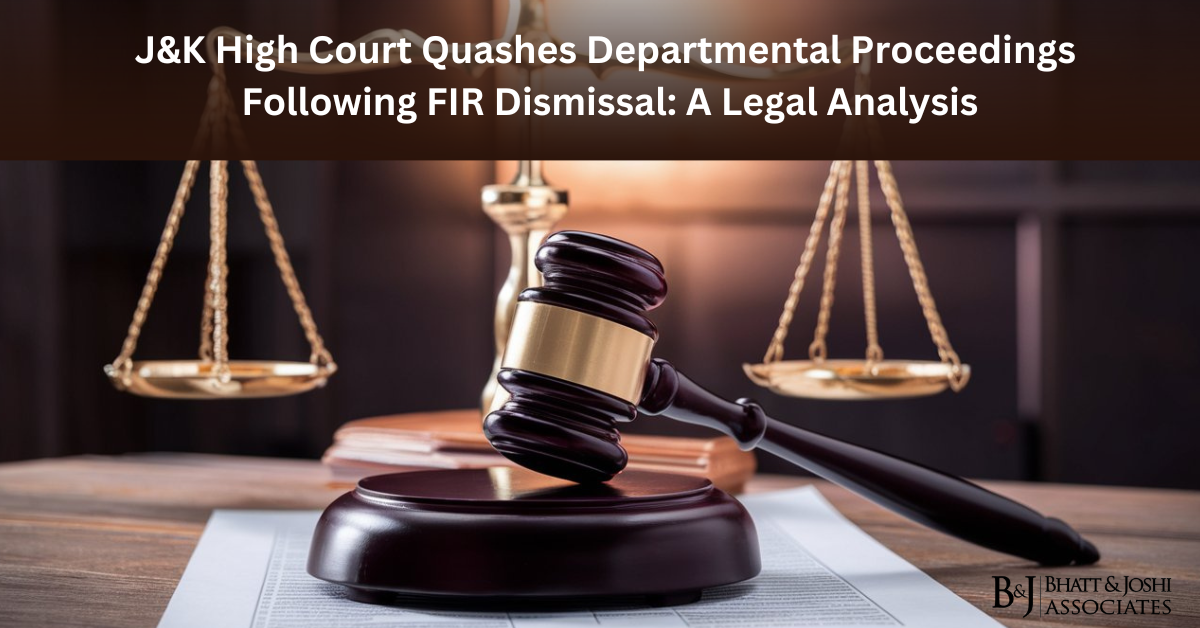Introduction
In a landmark judgment, the Jammu and Kashmir and Ladakh High Court ruled that departmental proceedings based on the same allegations as a quashed FIR cannot continue, upholding the principles of legal finality and protecting individuals from double jeopardy. This ruling, which came in the case of Jasvinder Singh Dua, Ex Managing Director (Under Suspension) of J&K Handicrafts (S&E) Corporation, emphasizes the court’s decision to Quash the ongoing departmental proceedings linked to the allegations.
Background of the Case
Jasvinder Singh Dua faced allegations of irregularities concerning his appointment, regularization, and promotions at the J&K Handicrafts (S&E) Corporation. These allegations led to both criminal charges by the Anti-Corruption Bureau (ACB) and subsequent departmental proceedings. After the High Court quashed the FIR against Dua, finding the allegations unsubstantiated, he challenged the continuation of the departmental proceedings on the same grounds.
Legal Grounds for Quashing Departmental Proceedings
Principle of Double Jeopardy
Justice Javed Iqbal Wani highlighted that the continuation of departmental proceedings after the acquittal in a criminal case, on the same set of allegations, constitutes double jeopardy. This principle prevents a person from being tried or punished twice for the same offense, ensuring fairness and justice in legal processes.
Key Observation from Justice Wani:
“Once the FIR registered by the Anti-Corruption Bureau (ACB) is quashed by this court…the departmental proceedings/disciplinary action initiated against the petitioner on the identical and similar set of facts/allegations cannot be continued as same would amount to sitting over the judgement of this court.”
Supreme Court Precedent
The ruling was supported by referencing the Supreme Court’s decision in “Ram Lal vs. State of Rajasthan 2023”, where it was held that an acquittal in criminal proceedings due to insufficient evidence should generally lead to the discontinuation of related departmental inquiries.
Jurisdictional Issues
The court also addressed jurisdictional issues, noting that the corporation, governed by its own Articles of Association and service rules, was the appropriate authority for initiating or discontinuing disciplinary actions against Dua, not the government. This aspect underscores the necessity of respecting organizational governance structures in disciplinary matters.
Implications of High Court’s Decision to Quash Departmental Proceedings
The judgment sets a significant precedent for the treatment of departmental proceedings following criminal cases, particularly emphasizing:
– Legal Consistency: Ensuring that departmental actions do not contradict or disregard the outcomes of judicial proceedings.
– Protection of Rights: Safeguarding individuals from the undue burden of facing multiple proceedings for the same set of allegations.
– Governance and Authority: Clarifying the roles and powers of organizational structures in disciplinary matters.
Conclusion: J&K High Court Quashes Departmental Actions
The Jammu and Kashmir and Ladakh High Court’s decision in the case of Jasvinder Singh Dua Vs UT of J&K reaffirms the judiciary’s role in ensuring that departmental proceedings do not overstep legal boundaries or undermine the outcomes of judicial decisions. By quashing the continuation of departmental proceedings that paralleled a quashed FIR, the court has reinforced the principles of justice, fairness, and respect for judicial processes.
This judgment not only protects the rights of individuals like Dua but also guides corporations and governmental bodies in handling similar cases, ensuring that legal processes are followed with due diligence and respect for individual rights.














